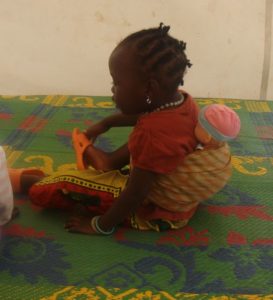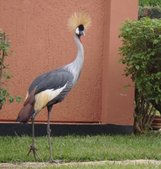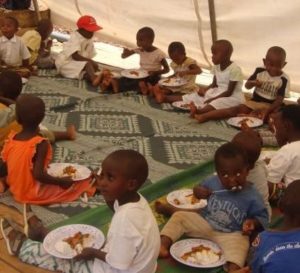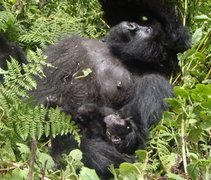Caroline Henderson — known as Caz — is a head teacher at a London nursery and kindly volunteered to set up the Aspire workplace childcare centre. She spent the month of February in Kigali preparing the childcare space and learning materials, as well as training the teachers. While there, Caz wrote about her experiences. We’ve archived her blog posts here, starting with her first post from Rwanda.
Starting with a step up in life
My days so far have been taken up with trying to organise the childcare centre, which is actually a wooden platform with a tent forming the roof and walls. None of the Aspire women have any notion about giving their child their time and attention – simply because all their energy is spent on trying to survive. Hopefully we may give these deprived children an advantage as they begin life.
On Monday, Wednesday and Friday I will have about 55 children with me, and on Tuesday and Thursday about 45!
At my nursery school in London we develop hand-eye coordination using pouring and picking up games. We use dried lentils, rice and beans, but of course here that is precious food – of which there is so little. It has been preying on my mind and yesterday, joy oh joy, it came to me. I was looking at the paper beads that the Aspire women make to thread and create necklaces to sell. Perfect: the nursery budget now buys unthreaded beads from the women, puts them in a large tray with sides, provides spoons, cups and small pots, and hey presto, happy little ones for hours! And the money goes back into the co-operative, and therefore the mothers begin to understand that they are helping their children’s education. I am still smiling and thrilled at finding a solution.
The war of the backpacks

I brought each child a handkerchief and backpack from London. They were handed out today amid huge excitement. If anyone saw the Frozen Planet episode of the penguins stealing others’ nest stones – that is what it reminded me of! In many cases as the children rushed off to show their mums their packs, the mums would eye another child’s pack, think it better, and tell their child to sneak up and swap it without anyone seeing! However, the backpacks are worn every day with great pride.
I have been assigned three ladies to my team – Jan, who is gentle, quiet and shy; Josephine, who wears the most wonderful traditional African outfits and is so smiley; and Virginie, who I think will be a good leader. Each day they interact more and more with the little ones, come up with ideas and realise that some sort of order is a good thing. Anyway, they are lovely. Language, or lack of it, is the most frustrating and tiring part of it all despite having a translator – everything takes so long and then I wonder whether what I said was actually said to them!
Using pens and wrapping the dolls in tea-towels brought from the nursery in London were the highlight of last week!
Resilience, and sadness
Sometimes I walk to work – takes about 50 minutes, for the most part along a main road. Once off the main road, a long, red dusty road leads up to Aspire, passing tiny shacks and shops selling mostly bananas, tomatoes and some sort of green veg. There’s a shoe mender too. People sit on the side of the track trying to sell their wares – I have never eaten so many bananas in my life!

I have met strong, interesting and good people – they all have their own tales to tell, and most of the stories are horrific and cruel beyond belief. I cannot find the words to write here, and anyway, you would not be able to see their eyes – that is where their grief lies.
On Saturday I went to the market: numerous aisles of shadowy stalls with bustling bodies shouting out their wares. I bartered and bought! And oh the mangoes – 4 for £1.75 ($3.00). Not bad for a taste of Heaven.
There is a crown crane living in the garden next to my bedroom, and I call it the Alarm bird. It leads the daily dawn chorus (and often during the night too) with a deafening shrowk, a mixture of a shriek and a caw.
We have a rain storm once a day that lasts about an hour. It starts with a soft rustle of the leaves and then large blobs of rain make bursts of red dust explode. Drumming rain creates channels in the red earth through which the water runs its course, making puddles and potholes. After the rain – ah, the smell.
Paying tribute to genocide victims
There is a rain storm once a day that lasts about an hour. It starts with a soft rustle of the leaves and then large blobs of rain make bursts of red dust explode. Drumming rain creates channels in the red earth through which the water runs its course, making puddles and potholes. After the rain – ah, the smell.
I had a day off and visited another Network for Africa project, a clinic at Ntarama – so very basic compared with all we are used to, but a medical haven for Rwandans.
We went on to the Ntarama and Nyamata genocide memorial sites. The belongings of the 10,000 Tutsi men, women and children massacred there are laid out on the benches. They ran to churches, thinking these holy places would provide safety – but the priests had other ideas and informed the murdering army. In the vaults are the hollow-eyed skulls of the victims. A local woman is caretaker at the Nyamata site. She goes there early in the morning each and every day to be with her slaughtered husband. She stays until dark. She had been visiting her ill mother elsewhere when the village was attacked, so she survived while her husband did not.
I am not able to say much more on this – basic brutality of the very lowest form. And from what I hear about Syria, I don’t believe humankind have learned a thing.
Up close and personal with the gorillas
A very early rise on Tuesday (5.00) to go gorilla trekking, starting at the Volcano National Park. On arrival, very welcome coffee and tea were available as we watched traditional warrior dances and singing. I realise it was put on for tourists but nonetheless just thought it fantastic – the drums vibrated in my insides and the beat was irresistible.
We started our trek at 8.30 (led by our guide, Edward), walking through beautifully kept, softly undulating fields, almost orchard-like, until we reached 2,400 meters. We clambered over a rickety stone wall marking the beginning of the national park and made our way through a thick bamboo plantation. From then on it was up, up, up the side of the volcano (and sometimes sliding down, down, down) through almost-impenetrable, dense shrubs, lethal thorn bushes and merciless ant colonies that found their way onto every part of my well-covered body.
When we reached 2,800 meters, I realised that every bit had been worth it: we found the Hirwa gorilla family headed by Mr Lucky, the immense silver back so obviously in charge and HUGE! He looked like a couch potato as he silently, intently and intelligently observed us all. Actually, human couch potatoes seldom look as intelligent. For 45 minutes I sat within 4 meters of a mother and her 10 day old baby – what an honour. I was mesmerised and entranced.
All too soon – each visit is kept strictly to one hour only – we began the long trek down, though it was not as long as the long trek up! On the way back we stopped to visit one of Network for Africa’s partner organisations that runs a school for deaf orphans – a sanctuary indeed.
Returning to the childcare centre
What a welcome I was given on my return to the childcare centre on Wednesday! Having had a break, I was able to see the wood from the trees and realised just how much progress has been achieved. Lots of activities and some order are

now in place, and it is a happy, busy and loving place distinct from the poverty surrounding it. Hugely rewarding to see.
It’s still rather rainy and thunderous here. I am now a huge fan of the BBC World Service and BBC iPlayer. And I would honestly like to wring the neck of the Alarm Bird in the next door garden.
At the childcare centre each day there is clapping and dancing and laughing, laughing, laughing. Their laughter is SO infectious – I laugh just watching them. The children were given their first daily school lunch last Monday. Rice, vegetables and meat – for most of them the only food they will have all day. I can already see their life level rising, a rewarding sight.
Last Wednesday I visited another Network for Africa project, the Rwanda Multi Learning Centre, which was set up for orphans and is supported by N4A and run by Moses. The Learning Centre teaches English, IT, music, business studies etc., to a pretty high standard. Really excellent and inspirational. It plays on my mind constantly as to how many young people are orphans. At the Learning Centre, 87 percent are orphans. In most cases, they have no family at all, no one to believe in them or encourage them. A sobering thought.
Saying goodbye to Rwanda, for now
This time next week I will back in London. And what have I learned?
Certainly that the simplest of things in life that we take for granted can mean the world to others and can change their lives.
That listening is important – the experiences of others can teach us quite a bit if we give them time to tell, and that compassion is a wonderful characteristic but works more efficiently when sentimentality is added by the teaspoonful rather than by the ladleful.
That African skies are bigger and the stars brighter and more numerous.
That I still hate cockroaches with a passion and I still long for a PG tips cuppa!
That each day I have been humbled by the strength and hope shown by the outstanding and brave women and children of Aspire.
And what will they say of me? I have no idea – if I am only remembered for the hugs and laughter, that is fine by me.
So finally, if any of you feel you can donate to Network for Africa you would be doing a great thing. It is a charity, doing great work.
CAZ
